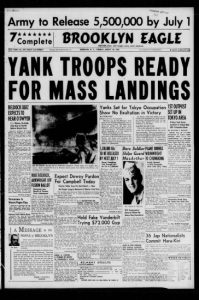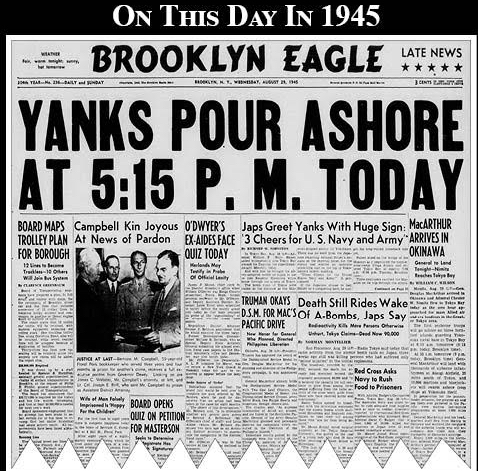
August 29: ON THIS DAY in 1945, Yanks raise flag over Japanese soil

ON THIS DAY IN 1854, the Brooklyn Daily Eagle reported, “Hook and Ladder Truck No. 1 — This company brought home their new truck yesterday, and safely ensconced her in Firemen’s Hall, Henry street. The apparatus is painted red, and ornamented with the figures of eagles which are placed on each side, above the wheels, giving the whole a fine appearance. The company, which turned out in full numbers, was accompanied by the Brooklyn Band, and in the evening all hands and invited guests made themselves merry at a table spread with seasonable viands and exhilarating fluids. They had a good time. May they have many such.”
***
ON THIS DAY IN 1883, the Eagle reported, “An island inhabited by some millions of people and studded with volcanoes suddenly became the theater of the most extraordinary manifestation of those activities for which science is able to give but a poor explanation. Some time ago a small volcanic island a few miles off the coast and containing a volcano was observed to be in a state of excitement. This was not an unusual occurrence, it appears, and though the wonderful phenomena were watched with intense interest, no especial alarm was felt in the main island. The glow and detonations on Krakatoa were distinctly perceptible forty-five miles distant, and a few hours later a shower of red hot rocks and ashes began to fall. The deposit increased for several hours; the water which separates the two islands was observed to be in a state of profound agitation, literally boiling or approaching that state. The bed of the strait was undoubtedly heated to a tremendous temperature, sharing the condition of Krakatoa. For 500 miles round the sea gave evidences of similar disturbances. But the sinister energy at work was traveling steadily toward Java carrying death and devastation with it.”
Leave a Comment
Leave a Comment